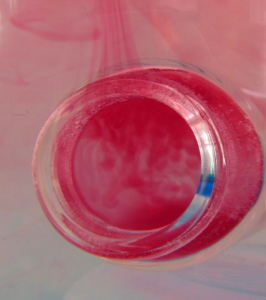
Double-diffusive mixing
On the coolest process in oceanography.
My favorite oceanographic process, as all of my students and many of my acquaintances know, is double-diffusive mixing. Look at how awesome it is:
Double-diffusive mixing happens because heat and salt’s molecular diffusion are very different: Heat diffuses about a factor 100 faster than salt. This can lead to curious phenomena: Bodies of water with a stable stratification in density will start to mix much more efficiently than one would have thought.
In the specific case of a stable density stratification with warm, salty water over cold, fresh water, finger-like structures form. Those structures are called “salt fingers”, the process is “salt fingering”.

Salt fingering happening with the red food dye acting as “salt”.
Even though salt fingers are tiny compared to the dimensions of the ocean, they still have a measurable effect on the oceanic stratification in the form of large-scale layers and stair cases, and not only the stratification in temperature and salinity, but also on nutrient availability in the subtropical gyres, for example, or on CO2 drawdown.
Over the next couple of posts, I will focus on double diffusive mixing, but less on the science and more on how it can be used in teaching. (If you want to know more about the science, there are tons of interesting papers around, for example my very first paper)
Salt fingering – Mirjam S. Glessmer says:
[…] I mentioned in this post, I have used double-diffusive mixing extensively in my teaching. For several reasons: Firstly, I […]
Diffusive layering. Or: This is not a trick question! | says:
[…] having talked extensively about double diffusive mixing in my courses, I tend to assume that students not only remember that there is such thing as […]
Salt fingering | says:
[…] I mentioned in this post, I have used double-diffusive mixing extensively in my teaching. For several reasons: Firstly, I […]